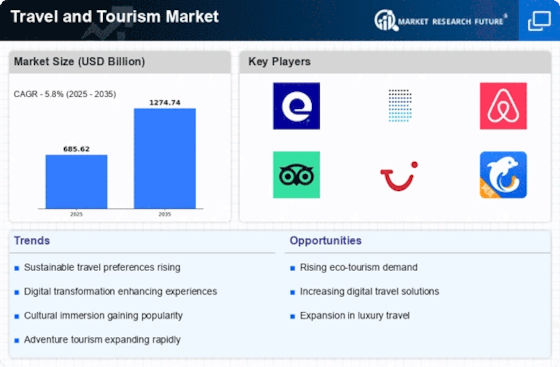-
Travel Tourism Market,BY Type
-
Overview
-
Leisure
-
Educational
-
Business
-
Sports
-
Medical Tourism
-
Others (Event Travel, Volunteer Travel, etc.)
-
Travel Tourism Market,BY Application
-
Overview
-
Domestic
-
International
-
Travel Tourism Market,BY Traveler Type
-
Overview
-
Solo Traveler
-
Couple Traveler
-
Group Traveler
-
Travel Tourism Market, by Travel Days
-
Overview
-
Less than 7 Days
-
8- 15 Days
-
16-30 Days
-
More than 30 Days
-
Travel Tourism Market, by Travel Mode
-
Overview
-
Travel Packages
-
Self-catered
-
Travel Tourism Market, by Booking
-
Overview
-
Online
-
Offline
-
Travel Tourism Market, by Region
-
Overview
-
North America
-
US
-
Canada
-
Europe
-
Germany
-
France
-
UK
-
Italy
-
Spain
-
Rest of Europe
-
Asia-Pacific
-
China
-
India
-
Japan
-
South Korea
-
Australia
-
Rest of Asia-Pacific
-
Rest of the World
-
Middle East
-
Africa
-
Latin America
-
Competitive Landscape
-
Overview
-
Competitive Analysis
-
Market Share Analysis
-
Major Growth Strategy in the Global Travel and Tourism Market,
-
Competitive Benchmarking
-
Leading Players in Terms of Number of Developments in the Global Travel and Tourism Market,
-
Key developments and Growth Strategies
-
New ProductLaunch/Service Deployment
-
Merger &Acquisitions
-
Joint Ventures
-
Major Players Financial Matrix
-
Sales & Operating Income,2022
-
Major Players R&D Expenditure.2022
-
Company ProfileS
-
United Airlines,
-
Company Overview
-
Financial Overview
-
Products Offered
-
Key Developments
-
SWOT Analysis
-
Key Strategies
-
Emirates,
-
Company Overview
-
Financial Overview
-
Products Offered
-
Key Developments
-
SWOT Analysis
-
Key Strategies
-
Southwest Airlines,
-
Company Overview
-
Financial Overview
-
Products Offered
-
Key Developments
-
SWOT Analysis
-
Key Strategies
-
Uber,
-
Company Overview
-
Financial Overview
-
Products Offered
-
Key Developments
-
SWOT Analysis
-
Key Strategies
-
Mariott,
-
Company Overview
-
Financial Overview
-
Products Offered
-
Key Developments
-
SWOT Analysis
-
Key Strategies
-
Hyatt,
-
Company Overview
-
Financial Overview
-
Products Offered
-
Key Developments
-
SWOT Analysis
-
Key Strategies
-
Hilton,
-
Company Overview
-
Financial Overview
-
Products Offered
-
Key Developments
-
SWOT Analysis
-
Key Strategies
-
Carnival Cruise Line,
-
Company Overview
-
Financial Overview
-
Products Offered
-
Key Developments
-
SWOT Analysis
-
Key Strategies
-
Royal Caribbean,
-
Company Overview
-
Financial Overview
-
Products Offered
-
Key Developments
-
SWOT Analysis
-
Key Strategies
-
Central Japan Railway,
-
Company Overview
-
Financial Overview
-
Products Offered
-
Key Developments
-
SWOT Analysis
-
Key Strategies
-
East Japan Railway,
-
Company Overview
-
Financial Overview
-
Products Offered
-
Key Developments
-
SWOT Analysis
-
Key Strategies
-
Norfolk Southern,
-
Company Overview
-
Financial Overview
-
Products Offered
-
Key Developments
-
SWOT Analysis
-
Key Strategies
-
Appendix
-
References
-
Related Reports
-
LIST OF TABLES
-
Global Travel and Tourism Market, Synopsis, 2018-2032
-
Global Travel and Tourism Market, Estimates &Forecast, 2018-2032(USD BILLION)
-
Travel Tourism Market,BY Type, 2018-2032 (USD BILLION)
-
Travel Tourism Market,BY Application, 2018-2032 (USD BILLION)
-
Travel Tourism Market,BY Traveler Type, 2018-2032 (USD BILLION)
-
Travel Tourism Market, by Travel Days, 2018-2032 (USD BILLION)
-
Travel Tourism Market, by Travel Mode, 2018-2032 (USD BILLION)
-
Travel Tourism Market, by Booking, 2018-2032 (USD BILLION)
-
North America: Travel Tourism Market,BY Type, 2018-2032 (USD BILLION)
-
North America: Travel Tourism Market,BY Application, 2018-2032 (USD BILLION)
-
North America: Travel Tourism Market,BY Traveler Type, 2018-2032 (USD BILLION)
-
North america: Travel Tourism Market,BY Travel Days,2018-2032 (USD BILLION)
-
North america: Travel Tourism Market,BY Travel Mode,2018-2032 (USD BILLION)
-
North america: Travel Tourism Market,BY Booking,2018-2032 (USD BILLION)
-
US: Travel Tourism Market,BY Type, 2018-2032 (USD BILLION)
-
US: Travel Tourism Market,BY Application, 2018-2032 (USD BILLION)
-
US: Travel Tourism Market,BY Traveler Type, 2018-2032 (USD BILLION)
-
US: Travel Tourism Market,BY Travel Days,2018-2032 (USD BILLION)
-
US: Travel Tourism Market,BY Travel mode,2018-2032 (USD BILLION)
-
US: Travel Tourism Market,BY Booking,2018-2032 (USD BILLION)
-
Canada: Travel Tourism Market,BY Type, 2018-2032 (USD BILLION)
-
Canada: Travel Tourism Market,BY Application, 2018-2032 (USD BILLION)
-
Canada: Travel Tourism Market,BY Traveler Type, 2018-2032 (USD BILLION)
-
Canada: Travel Tourism Market,BY Travel Days,2018-2032 (USD BILLION)
-
Canada: Travel Tourism Market,BY Travel Mode,2018-2032 (USD BILLION)
-
Canada: Travel Tourism Market,BY Booking,2018-2032 (USD BILLION)
-
Europe: Travel Tourism Market,BY Type, 2018-2032 (USD BILLION)
-
Europe: Travel Tourism Market, BY Application, 2018-2032 (USD BILLION)
-
Europe: Travel Tourism Market, BY Traveler Type, 2018-2032 (USD BILLION)
-
Europe: Travel Tourism Market,BY Travel Days,2018-2032 (USD BILLION)
-
Europe: Travel Tourism Market,BY Travel Mode,2018-2032 (USD BILLION)
-
Europe: Travel Tourism Market,BY booking,2018-2032 (USD BILLION)
-
germany: Travel Tourism Market,BY Type,2018-2032 (USD BILLION)
-
germany: Travel Tourism Market, BY Application, 2018-2032 (USD BILLION)
-
germany: Travel Tourism Market, BY Traveler Type, 2018-2032 (USD BILLION)
-
germany: Travel Tourism Market,BY Travel Days,2018-2032 (USD BILLION)
-
germany: Travel Tourism Market,BY Travel Mode,2018-2032 (USD BILLION)
-
germany: Travel Tourism Market,BY Booking,2018-2032 (USD BILLION)
-
FRANCE: Travel Tourism Market,BY Type, 2018-2032 (USD BILLION)
-
FRANCE: Travel Tourism Market, BY Application, 2018-2032 (USD BILLION)
-
FRANCE: Travel Tourism Market, BY Traveler Type, 2018-2032 (USD BILLION)
-
France: Travel Tourism Market,BY Travel Days,2018-2032 (USD BILLION)
-
France: Travel Tourism Market,BY Travel Mode,2018-2032 (USD BILLION)
-
France: Travel Tourism Market,BY Booking,2018-2032 (USD BILLION)
-
italy: Travel Tourism Market,BY Type, 2018-2032 (USD BILLION)
-
italy: Travel Tourism Market, BY Application, 2018-2032 (USD BILLION)
-
italy: Travel Tourism Market, BY Traveler Type, 2018-2032 (USD BILLION)
-
italy: Travel Tourism Market,BY Travel Days,2018-2032 (USD BILLION)
-
italy: Travel Tourism Market,BY Travel Mode,2018-2032 (USD BILLION)
-
italy: Travel Tourism Market,BY Booking,2018-2032 (USD BILLION)
-
spain: Travel Tourism Market,BY Type, 2018-2032 (USD BILLION)
-
spain: Travel Tourism Market, BY Application, 2018-2032 (USD BILLION)
-
spain: Travel Tourism Market, BY Traveler Type, 2018-2032 (USD BILLION)
-
spain: Travel Tourism Market,BY Travel Days,2018-2032 (USD BILLION)
-
spain: Travel Tourism Market,BY Travel Mode,2018-2032 (USD BILLION)
-
spain: Travel Tourism Market,BY booking,2018-2032 (USD BILLION)
-
UK: Travel Tourism Market,BY Type, 2018-2032 (USD BILLION)
-
UK: Travel Tourism Market, BY Application, 2018-2032 (USD BILLION)
-
UK: Travel Tourism Market, BY Traveler Type, 2018-2032 (USD BILLION)
-
uk: Travel Tourism Market,BY Travel Days, 2018-2032 (USD BILLION)
-
uk: Travel Tourism Market,BY Travel Mode, 2018-2032 (USD BILLION)
-
uk: Travel Tourism Market,BY booking, 2018-2032 (USD BILLION)
-
rest of europe: Travel Tourism Market,BY Type, 2018-2032 (USD BILLION)
-
rest of europe: Travel Tourism Market, BY Application, 2018-2032 (USD BILLION)
-
rest of europe: Travel Tourism Market, BY Traveler Type, 2018-2032 (USD BILLION)
-
REST OF EUROPE: Travel Tourism Market,BY Travel Days,2018-2032 (USD BILLION)
-
REST OF EUROPE: Travel Tourism Market,BY Travel Mode,2018-2032 (USD BILLION)
-
REST OF EUROPE: Travel Tourism Market,BY booking,2018-2032 (USD BILLION)
-
Asia-Pacific: Travel Tourism Market,BY Type, 2018-2032 (USD BILLION)
-
Asia-Pacific: Travel Tourism Market, BY Application, 2018-2032 (USD BILLION)
-
Asia-Pacific: Travel Tourism Market, BY Traveler Type, 2018-2032 (USD BILLION)
-
ASIA-PACIFIC: Travel Tourism Market,BY Travel Days,2018-2032 (USD BILLION)
-
ASIA-PACIFIC: Travel Tourism Market,BY Travel Mode,2018-2032 (USD BILLION)
-
ASIA-PACIFIC: Travel Tourism Market,BY booking,2018-2032 (USD BILLION)
-
japan: Travel Tourism Market,BY Type, 2018-2032 (USD BILLION)
-
japan: Travel Tourism Market, BY Application, 2018-2032 (USD BILLION)
-
japan: Travel Tourism Market, BY Traveler Type, 2018-2032 (USD BILLION)
-
japan: Travel Tourism Market,BY Travel Days,2018-2032 (USD BILLION)
-
japan: Travel Tourism Market,BY Travel Mode,2018-2032 (USD BILLION)
-
japan: Travel Tourism Market,BY booking,2018-2032 (USD BILLION)
-
china: Travel Tourism Market,BY Type, 2018-2032 (USD BILLION)
-
china: Travel Tourism Market, BY Application, 2018-2032 (USD BILLION)
-
china: Travel Tourism Market, BY Traveler Type, 2018-2032 (USD BILLION)
-
china: Travel Tourism Market,BY Travel Days,2018-2032 (USD BILLION)
-
china: Travel Tourism Market,BY Travel Mode,2018-2032 (USD BILLION)
-
china: Travel Tourism Market,BY booking,2018-2032 (USD BILLION)
-
india: Travel Tourism Market,BY Type, 2018-2032 (USD BILLION)
-
india: Travel Tourism Market, BY Application, 2018-2032 (USD BILLION)
-
india: Travel Tourism Market, BY Traveler Type, 2018-2032 (USD BILLION)
-
india: Travel Tourism Market,BY Travel Days,2018-2032 (USD BILLION)
-
india: Travel Tourism Market,BY Travel Mode,2018-2032 (USD BILLION)
-
india: Travel Tourism Market,BY booking,2018-2032 (USD BILLION)
-
australia: Travel Tourism Market,BY Type, 2018-2032 (USD BILLION)
-
australia: Travel Tourism Market, BY Application, 2018-2032 (USD BILLION)
-
australia: Travel Tourism Market, BY Traveler Type, 2018-2032 (USD BILLION)
-
australia: Travel Tourism Market,BY Travel Days,2018-2032 (USD BILLION)
-
australia: Travel Tourism Market,BY Travel Mode,2018-2032 (USD BILLION)
-
australia: Travel Tourism Market,BY booking,2018-2032 (USD BILLION)
-
south korea: Travel Tourism Market,BY Type, 2018-2032 (USD BILLION)
-
south korea: Travel Tourism Market, BY Application, 2018-2032 (USD BILLION)
-
south korea: Travel Tourism Market, BY Traveler Type, 2018-2032 (USD BILLION)
-
south korea: Travel Tourism Market,BY Travel Days,2018-2032 (USD BILLION)
-
south korea: Travel Tourism Market,BY Travel Mode ,2018-2032 (USD BILLION)
-
south korea: Travel Tourism Market,BY booking ,2018-2032 (USD BILLION)
-
rest of asia-pacific: Travel Tourism Market,BY Type, 2018-2032 (USD BILLION)
-
rest of asia-pacific: Travel Tourism Market, BY Application, 2018-2032 (USD BILLION)
-
rest of asia-pacific: Travel Tourism Market, BY Traveler Type, 2018-2032 (USD BILLION)
-
REST OF ASIA-PACIFIC: Travel Tourism Market,BY Travel Mode,2018-2032 (USD BILLION)
-
REST OF ASIA-PACIFIC: Travel Tourism Market,BY Travel Days,2018-2032 (USD BILLION)
-
REST OF ASIA-PACIFIC: Travel Tourism Market,BY booking,2018-2032 (USD BILLION)
-
rest of the world: Travel Tourism Market,BY Type, 2018-2032 (USD BILLION)
-
rest of the world: Travel Tourism Market, BY Application, 2018-2032 (USD BILLION)
-
rest of the world: Travel Tourism Market, BY Traveler Type, 2018-2032 (USD BILLION)
-
REST OF THE WORLD: Travel Tourism Market,BY Travel Days,2018-2032 (USD BILLION)
-
REST OF THE WORLD: Travel Tourism Market,BY Travel Mode,2018-2032 (USD BILLION)
-
REST OF THE WORLD: Travel Tourism Market,BY booking,2018-2032 (USD BILLION)
-
Middle east: Travel Tourism Market,BY Type, 2018-2032 (USD BILLION)
-
Middle east: Travel Tourism Market, BY Application, 2018-2032 (USD BILLION)
-
Middle east: Travel Tourism Market, BY Traveler Type, 2018-2032 (USD BILLION)
-
MIDDLE EAST: Travel Tourism Market,BY Travel Days,2018-2032 (USD BILLION)
-
MIDDLE EAST: Travel Tourism Market,BY Travel Mode,2018-2032 (USD BILLION)
-
MIDDLE EAST: Travel Tourism Market,BY booking,2018-2032 (USD BILLION)
-
Africa: Travel Tourism Market,BY Type, 2018-2032 (USD BILLION)
-
Africa: Travel Tourism Market, BY Application, 2018-2032 (USD BILLION)
-
Africa: Travel Tourism Market, BY Traveler Type, 2018-2032 (USD BILLION)
-
Africa: Travel Tourism Market,BY TRAVEL DAYS,2018-2032 (USD BILLION)
-
Africa: Travel Tourism Market,BY Travel Mode,2018-2032 (USD BILLION)
-
Africa: Travel Tourism Market,BY booking,2018-2032 (USD BILLION)
-
Latin america: Travel Tourism Market,BY Type, 2018-2032 (USD BILLION)
-
Latin america: Travel Tourism Market, BY Application, 2018-2032 (USD BILLION)
-
Latin america: Travel Tourism Market, BY Traveler Type, 2018-2032 (USD BILLION)
-
LATIN AMERICA: Travel Tourism Market,BY TRAVEL DAYS,2018-2032 (USD BILLION)
-
LATIN AMERICA: Travel Tourism Market,BY Travel Mode,2018-2032 (USD BILLION)
-
LATIN AMERICA: Travel Tourism Market,BY booking,2018-2032 (USD BILLION)
-
LIST OF FIGURES
-
Research Process
-
Market Structure for the Global Travel and Tourism Market
-
Market Dynamics for the Global Travel and Tourism Market
-
Global Travel and Tourism Market, Share (%), BY Type, 2022
-
Global Travel and Tourism Market, Share (%), BY Application, 2022
-
Global Travel and Tourism Market, Share (%), BY Traveler Type, 2022
-
Global Travel and Tourism Market, Share (%), BY Travel Days,2022
-
Global Travel and Tourism Market, Share (%), BY Travel Mode,2022
-
Global Travel and Tourism Market, Share (%), BY booking,2022
-
Global Travel and Tourism Market, Share (%), by Region, 2022
-
north AMERICA: TRAVEL AND TOURISM MARKET, SHARE (%), BY REGION, 2022
-
Europe: TRAVEL AND TOURISM MARKET, SHARE (%), BY REGION, 2022
-
Asia-Pacific: TRAVEL AND TOURISM MARKET, SHARE (%), BY REGION, 2022
-
Rest of the world: TRAVEL AND TOURISM MARKET, SHARE (%), BY REGION, 2022
-
Global Travel and Tourism Market: Company Share Analysis, 2022 (%)
-
United Airlines,: FINANCIAL OVERVIEW SNAPSHOT
-
United Airlines,: SWOT ANALYSIS
-
Emirates,:FINANCIAL OVERVIEW SNAPSHOT
-
Emirates,:SWOT ANALYSIS
-
Southwest Airlines,:FINANCIAL OVERVIEW SNAPSHOT
-
Southwest Airlines,:SWOT ANALYSIS
-
Uber,: FINANCIAL OVERVIEW SNAPSHOT
-
Uber,:SWOT ANALYSIS
-
Mariott,.:FINANCIAL OVERVIEW SNAPSHOT
-
Mariott,.:SWOT ANALYSIS
-
Hyatt,:FINANCIAL OVERVIEW SNAPSHOT
-
Hyatt,:SWOT ANALYSIS
-
Hilton,: FINANCIAL OVERVIEW SNAPSHOT
-
Hilton,: SWOT ANALYSIS
-
Carnival Cruise Line,: FINANCIAL OVERVIEW SNAPSHOT
-
Carnival Cruise Line,: SWOT ANALYSIS
-
Royal Caribbean,: FINANCIAL OVERVIEW SNAPSHOT
-
Royal Caribbean,: SWOT ANALYSIS
-
Central Japan Railway,:FINANCIAL OVERVIEW SNAPSHOT
-
Central Japan Railway,:SWOT ANALYSIS
-
East Japan Railway,,: FINANCIAL OVERVIEW SNAPSHOT
-
East Japan Railway,,: SWOT ANALYSIS
-
Norfolk Southern,:FINANCIAL OVERVIEW SNAPSHOT
-
Norfolk Southern,:SWOT ANALYSIS


















Leave a Comment